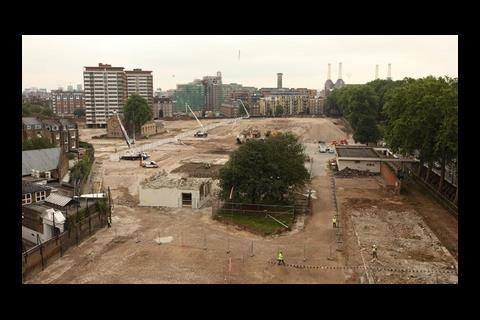Concern grows over royal influence, as developer announces longlist for Chelsea Barracks redesign and appoints prince’s foundation as adviser
Robert Adam and Demetri Porphyrios are top of a list of 14 architects drawn up by developer Qatari Diar to replace Rogers Stirk Harbour + Partners on the £1bn Chelsea Barracks scheme.
It is understood that the two practices, both closely associated with the Prince’s Foundation for the Built Environment, were named by Qatari Diar as possible architects for the scheme before the original proposals were withdrawn.
The news comes as the developer said it had asked the Prince’s Foundation for the Built Environment to advise on the drawing up of a masterplan for the site (see below). It is understood that separate architects will be employed to design individual buildings.
A Qatari Diar spokesperson said it had already compiled a longlist of 14 practices for the masterplanning job, but refused to confirm names. Adam’s practice masterplanned parts of Poundbury for the Duchy of Cornwall and Porphyrios is known for his work at Oxford and Cambridge universities.
The invitation of Building columnist Adam and Porphyrios to submit designs is likely to further anger modernist architects upset by the prince’s intervention.
Other architects thought to be in the running include Belgravia-based Paul Davis + Partners, which was shortlisted against Rogers in the original competition and has been promoted by local residents’ group, the Belgravia Residents Association. Davis said he would welcome the opportunity to help “find a solution” for Chelsea Barracks.
Qatari Diar’s proposals for the site were withdrawn last Friday after months of lobbying by local residents and the intervention of Prince Charles, who wrote to the developers requesting they look again at the plans.
In response, Lord Rogers launched an attack on the prince this week, accusing him of “single-handedly destroying the project” which would have created 5,000 construction jobs, and calling for a public inquiry into his constitutional powers.
Rynd Smith, director of policy at the Royal Town Planning Institute, said there was no evidence the prince had sought to influence the planning decision: “It’s up to the developer if he listens to the prince. But if HRH had sought to subvert the planning process we’d be deeply concerned.”
Sunand Prasad, president of the RIBA, condemned the prince’s intervention but cautioned the profession against seeing it as a victory of neo-classicism over modernism. He said: “This decision clearly has more to do with external pressure than the merits of the scheme … I do not see this as a defeat for modern architecture.”
The decision not to continue with Rogers’ designs was met with jubilation by campaigners against the scheme in Chelsea. Georgie Thorburn, chairman of the Chelsea Barracks Action Group, said: “Rogers has himself entirely to blame. In his arrogance he thought he could undemocratically overrule Westminster council taxpayers. His bitter words issued from his classical Georgian house are nothing but sour grapes.”
'Respect context, heritage and community'

Hank Dittmar is chief executive of the Prince’s Foundation for the Built Environment, which has been appointed as a consultant to Qatari Diar.
The foundation has a particular expertise in engaging with communities and experts to produce masterplans for large and complex sites in a manner that respects context, heritage and community needs. This is particularly relevant in this case, as the site is in a special part of London, next to a Sir Christopher Wren building. It might be worthwhile for the developer to look into the fact that the five and six-storey mansion blocks on neighbouring streets are as dense as required by the planning brief, and continue to have real value, even after 100 years.
Our experience is that community engagement through a design process will often lead to a consensus, rather than acrimony. It also suggests that masterplanning schemes in phases, involving a number of architects to lend diversity to a neighbourhood, gets better results. It means they are formed around created urban spaces and blocks, rather than conceived as architectural compositions.
The foundation has been asked by Qatari Diar to participate in and provide advice on a more open and consultative masterplanning process, but will not be paid for its work.
'It’s a victory for nimbyism'

Piers Gough, director of architect practice CZWG, signed a letter calling for a boycott of Prince Charles’ speech at the RIBA Trust in May.
It’s a victory for nimbyism, as all these things are. You could say the prince became something of a figurehead for the nimbys but something like this would have happened anyway. It’s a very conservative area with the sort of people who become jabbering maniacs at the very sight of modern architecture.
I think the Prince’s Foundation will steer it towards something more progressive and not neo-classical. It doesn’t want to be seen as a laughing stock, and being branded an old-fashioned organisation wouldn’t do it any good.
I don’t think Chelsea Barracks affects architecture too much. The letter I signed said this wasn’t about a style war, but of course it is. It’s just we won the war so long ago that to get hung up on a skirmish seems a bit ridiculous.
How Rogers' Chelsea plan unravelled
31 January 2008
Candy Brothers finalise £959m deal to buy Chelsea Barracks from Ministry of Defence with Qatari Diar.
9 April
Rogers’ masterplan for Chelsea Barracks goes in for outline planning.
18 July
Cabe says Rogers’ designs are a “successful response” to the planning brief.
28 August
Rogers’ scheme is given outline planning consent.
10 November
Christian Candy’s CPC Group sells its stake to Qatari Diar.
6 April
Prince Charles’ letter branding Rogers’ designs “unsympathetic” leaked to Sunday newspaper.
20 April
Lord Foster, Frank Gehry and Zaha Hadid sign letter supporting Rogers’ scheme.
1 May
Qatari Diar issues statement in support of Rogers’ designs.
25 May 2009
Sunday newspaper reports designs will be scrapped.
12 June 2009
Qatari Diar withdraws planning application and announces intention to seek new architect.
The people's prince? From the web
Rogers’ arrogance shines through. Charles has done a great service in highlighting the scheme and championing the cause of the people who would have had to live with or by this dubious monstrosity.
Keith Hicks
Another vote for mediocrity - I am surprised there is anyone left willing to invest in the UK. Huge waste of fees, time and jobs. We appear to do the average very well.
SNP
It’s a mistake to simplify the argument as “new” vs “traditionalist”. Let’s think more about what makes a good space, and avoid the labels.
Susan Theron
I think Lord Rogers’ comments are tantamount to treason. How dare he speak against the Crown Prince like that? What is it with these architects always trying to make a statement? Off to
the Tower!
Lee
Prince Charles’ intervention has put thousands of British construction jobs at risk. In the midst of a recession, this is truly scandalous.
Steve Green
Oh come on! So somebody got their own way because of who they are and who they know. This happens every day in every walk of life, especially construction.
David Hamill
Postscript
Join the debate at www.building.co.uk/whatyouthink.






























5 Readers' comments